#translation Japanese
Explore tagged Tumblr posts
Text
I do sort of wish western anime fans would analyze anime and manga from a framework of japanese historical and cultural context. Specifically a lot of works from the 90s being influenced by the general aimlessness and ennui that a lot of people were experiencing due to the burst in the bubble economy and the national trauma caused by the sarin terrorist attack. I think in interacting with media that’s not local to our sociocultural/sociopolitical sphere it’s easy to forget that it’s influenced and shaped by the same kinds of factors that influence media within our own cultural dome and there ends up being this baseline misalignment of perception between the causative elements of a narrative and viewer interpretation of those elements. It’s a form of death of the author that i think, in some measure, hinders our ability to fully understand/come to terms with creator intent and the full scope of a work’s merits
#exilley's diary#this is about utena btw like. yeah its feminist and a coming of age horror story but also#it was in part ikuhara’s response to the changes he observed in the corporate anime industry and an attempt to subvert those trends#it doesnt really help that i feel certain aspects of the show are filtered through translation and certain cultural emphasises are lost#like for instance. the blood type symbolism. or wakaba’s gestures with making packed lunches#theyre incredibly japanese expressions of conventional gender roles that non-japanese audiences might not fully resonate with
26K notes
·
View notes
Text


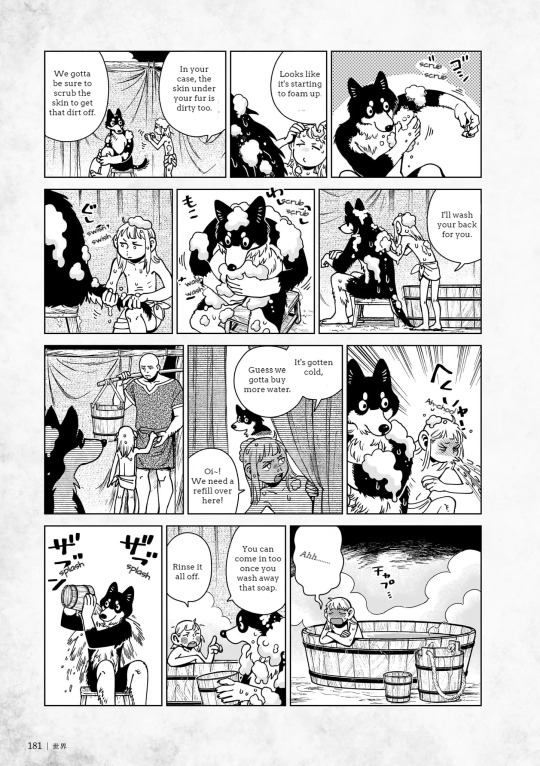
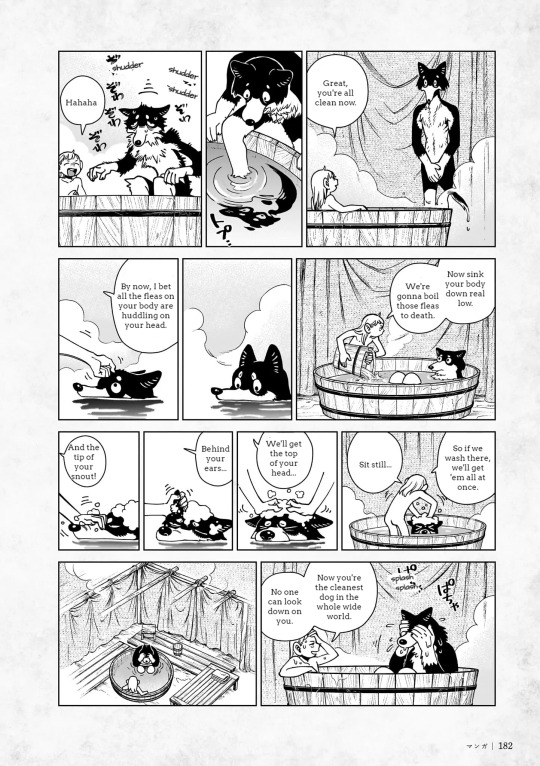


I couldn't find an English version so I put the fan translation of the sketch on top of the Dungeon Meshi: Adventurers Bible Complete Edition pages of this comic
#dungeon meshi#delicious in dungeon#mickbell#kuro#holm#daya#I don't speak japanese not my translation work I just mashed two images together
15K notes
·
View notes
Text

Dungeon Meshi - Female Dwarf beards
#Adventurers bible#dungeon meshi#Dwarves#Namari#Marcille Donato#Love Namari for calling them out#I checked the original in japanese and it says hige which as far as I know translates as beard#not sure why it was translated as whiskers in the official translation#Dunmeshi Extra
6K notes
·
View notes
Text

—Haruki Murakami, 1Q84
[That’s what the world is, after all: an endless battle of contrasting memories.]
16K notes
·
View notes
Text
There is a fairly significant bit of wordplay in Frieren that will escape the notice of most English-speaking viewers, but I quite like it so I’ll explain it here. The title of the series in Japanese is 葬送のフリーレン (Sousou no Furiiren). “Furiiren” is of course Frieren; “sousou” means “funeral rites” or “attending a funeral”, but can literally be translated as “sending to the grave”. Since the story opens with Frieren watching her old adventuring pals growing old and passing away, we’re naturally led to the simple interpretation of the title: she’s attending her friends’ funerals.
(The full official English title is Frieren: Beyond Journey’s End, because literal translations rarely make catchy titles.)
Later, as Frieren is fighting Aura, Lügner explains that Frieren is the most prolific demon-killer in history. In the English translations I’ve seen, this earns her the nickname “Frieren the Slayer”. But in the original Japanese, this nickname is 葬送のフリーレン: “Sousou no Furiiren”, the title of the series.
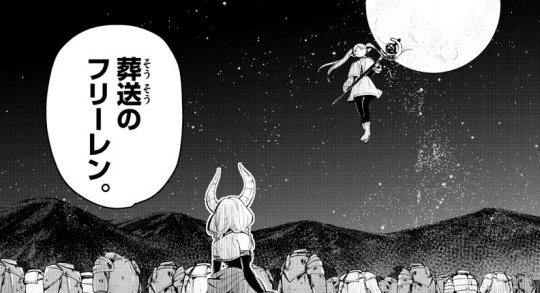
In this context, this line (and the title, too) could be more literally interpreted as “Frieren, who sends you to your grave”. It also means the line is a little more impactful in Japanese — you’re supposed to point at the screen and yell “hey that’s the name of the show!!”
There’s really just no way to preserve wordplay like this through translation so I can’t fault the translators at all for not trying, but it’s a fun thing that’s worth pointing out nonetheless. I just love that this was clearly something the author was setting up from the very beginning.
#frieren#sousou no frieren#frieren: beyond journey's end#frieren at the funeral#translation#japanese
8K notes
·
View notes
Text
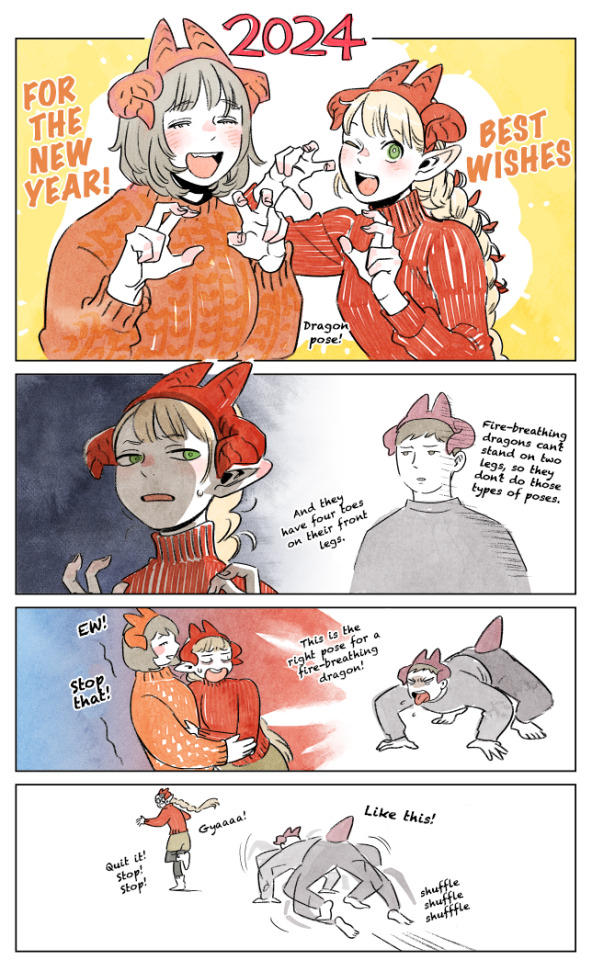
happy year of the dragon from this guy…
#something deeply wrong with him (affectionate)#also#eyeing the third panel like: hm. this too is yuri.#this is art ryoko kui posted to her official blog by the way#i just translated it from japanese#dungeon meshi#lunar new year#year of the dragon#manga#falin#laois#marcille#art
4K notes
·
View notes
Text
Gendered pronouns in Japanese vs English
In Revolutionary Girl Utena, the main character Utena is a girl (it says so in the title), but very conspicuously uses the masculine first person pronoun 僕 (boku) and dresses in (a variation of) the boys school uniform. Utena's gender, and gender in general, is a core theme of the work. And yet, I haven’t seen a single translation or analysis post where anyone considers using anything other than she/her for Utena when speaking of her in English. This made me wonder: how does one’s choice of pronouns in Japanese correspond to what one’s preferred pronouns would be in English?

There are 3 main differences between gendered pronouns in Japanese vs English
Japanese pronouns are used to refer to yourself (first-person), while English pronouns are used to refer to others (third-person)
The Japanese pronoun you use will differ based on context
Japanese pronouns signify more than just gender
Let’s look at each of these differences in turn and how these differences might lead to a seeming incongruity between one’s Japanese pronoun choice and one’s English pronoun choice (such as the 僕 (boku) vs she/her discrepancy with Utena).
Part 1: First-person vs third-person
While Japanese does technically have gendered third person pronouns (彼、彼女) they are used infrequently¹ and have much less cultural importance placed on them than English third person pronouns. Therefore, I would argue that the cultural equivalent of the gender-signifying third-person pronoun in English is the Japanese first-person pronoun. Much like English “pronouns in bio”, Japanese first-person pronoun choice is considered an expression of identity.
Japanese pronouns are used exclusively to refer to yourself, and therefore a speaker can change the pronoun they’re using for themself on a whim, sometimes mid-conversation, without it being much of an incident. Meanwhile in English, Marquis Bey argues that “Pronouns are like tiny vessels of verification that others are picking up what you are putting down” (2021). By having others use them and externally verify the internal truth of one’s gender, English pronouns, I believe, are seen as more truthful, less frivolous, than Japanese pronouns. They are seen as signifying an objective truth of the referent’s gender; if not objective then at least socially agreed-upon, while Japanese pronouns only signify how the subject feels at this particular moment — purely subjective.
Part 2: Context dependent pronoun use
Japanese speakers often don’t use just one pronoun. As you can see in the below chart, a young man using 俺 (ore) among friends might use 私 (watashi) or 自分 (jibun) when speaking to a teacher. This complicates the idea that these pronouns are gendered, because their gendering depends heavily on context. A man using 私 (watashi) to a teacher is gender-conforming, a man using 私 (watashi) while drinking with friends is gender-non-conforming. Again, this reinforces the relative instability of Japanese pronoun choice, and distances it from gender.

Part 3: Signifying more than gender
English pronouns signify little besides the gender of the antecedent. Because of this, pronouns in English have come to be a shorthand for expressing one’s own gender experience - they reflect an internal gendered truth. However, Japanese pronoun choice doesn’t reflect an “internal truth” of gender. It can signify multiple aspects of your self - gender, sexuality, personality.
For example, 僕 (boku) is used by gay men to communicate that they are bottoms, contrasted with the use of 俺 (ore) by tops. 僕 (boku) may also be used by softer, academic men and boys (in casual contexts - note that many men use 僕 (boku) in more formal contexts) as a personality signifier - maybe to communicate something as simplistic as “I’m not the kind of guy who’s into sports.” 俺 (ore) could be used by a butch lesbian who still strongly identifies as a woman, in order to signify sexuality and an assertive personality. 私 (watashi) may be used by people of all genders to convey professionalism. The list goes on.
I believe this is what’s happening with Utena - she is signifying her rebellion against traditional feminine gender roles with her use of 僕 (boku), but as part of this rebellion, she necessarily must still be a girl. Rather than saying “girls don’t use boku, so I’m not a girl”, her pronoun choice is saying “your conception of femininity is bullshit, girls can use boku too”.

Through translation, gendered assumptions need to be made, sometimes about real people. Remember that he/they, she/her, they/them are purely English linguistic constructs, and don’t correspond directly to one’s gender, just as they don’t correspond directly to the Japanese pronouns one might use. Imagine a scenario where you are translating a news story about a Japanese genderqueer person. The most ethical way to determine what pronouns they would prefer would be to get in contact with them and ask them, right? But what if they don’t speak English? Are you going to have to teach them English, and the nuances of English pronoun choice, before you can translate the piece? That would be ridiculous! It’s simply not a viable option². So you must make a gendered assumption based on all the factors - their Japanese pronoun use (context dependent!), their clothing, the way they present their body, their speech patterns, etc.
If translation is about rewriting the text as if it were originally in the target language, you must also rewrite the gender of those people and characters in the translation. The question you must ask yourself is: How does their gender presentation, which has been tailored to a Japanese-language understanding of gender, correspond to an equivalent English-language understanding of gender? This is an incredibly fraught decision, but nonetheless a necessary one. It’s an unsatisfying dilemma, and one that poignantly exposes the fickle, unstable, culture-dependent nature of gender.

Notes and References
¹ Usually in Japanese, speakers use the person’s name directly to address someone in second or third person
² And has colonialist undertones as a solution if you ask me - “You need to pick English pronouns! You ought to understand your gender through our language!”
Bey, Marquis— 2021 Re: [No Subject]—On Nonbinary Gender
Rose divider taken from this post
#langblr#japanese#japanese language#language#language learning#linguistics#learning japanese#utena#revolutionary girl utena#shojo kakumei utena#rgu#sku#gender#transgender#nonbinary#trans#official blog post#translation#media analysis
2K notes
·
View notes
Text





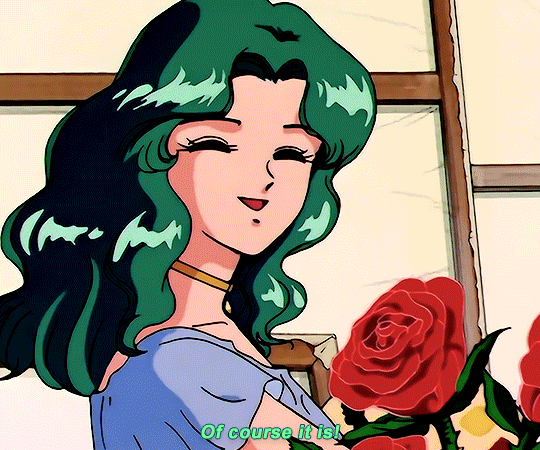
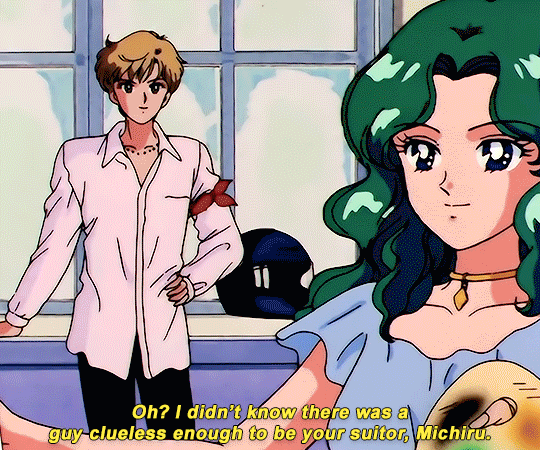
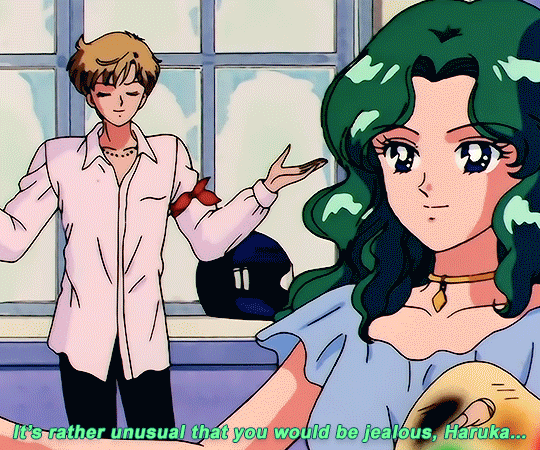
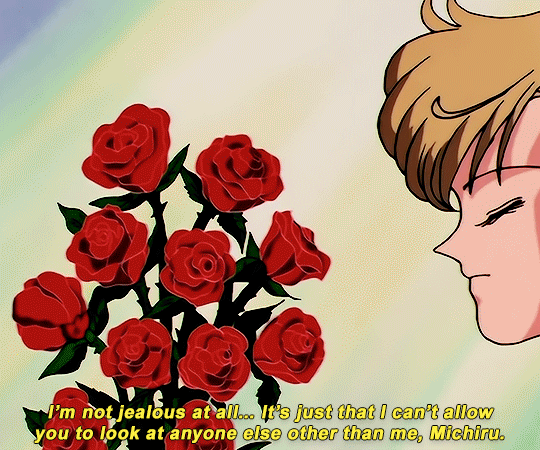
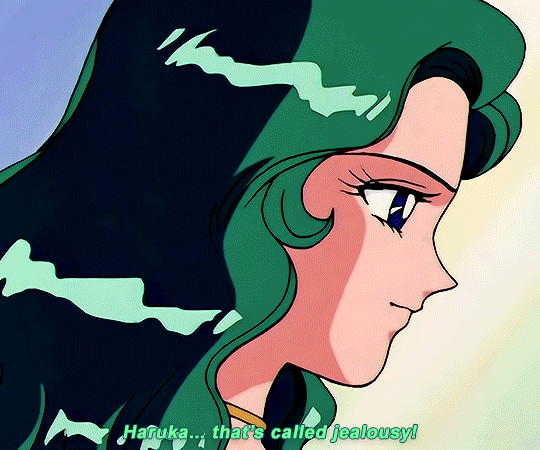
SAILOR MOON S: Episode 18 - 「芸術は愛の爆発!ちびうさの初恋」
#animeedit#sailor moon#sailormoonedit#oldanimeedit#harumichi#haruka x michiru#smedit#wlwedit#haruka tenoh#kaioh michiru#ep 107#bssm#bssmedit#pretty guardian sailor moon#bishojo senshi sailor moon#sailor neptune#sailor uranus#michiru kaioh#tenoh haruka#HI YES THIS BLOG IS ALIVE im trying to juggle trying to make gifs for this sideblog and the other fandom one lol#i had to change some of the translation bc the context was slightly wrong...#japanese is such a hard language to translate into english sometimes#also coloring anime is so difficult sometimes im really not used to it#especially old anime haha
2K notes
·
View notes
Text
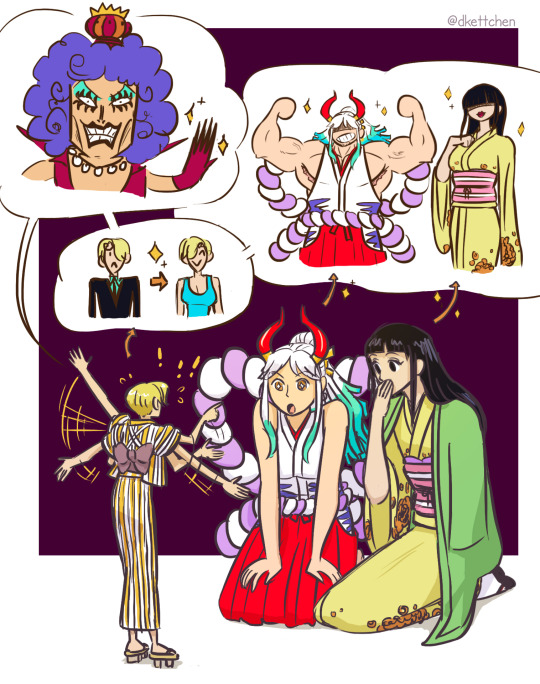
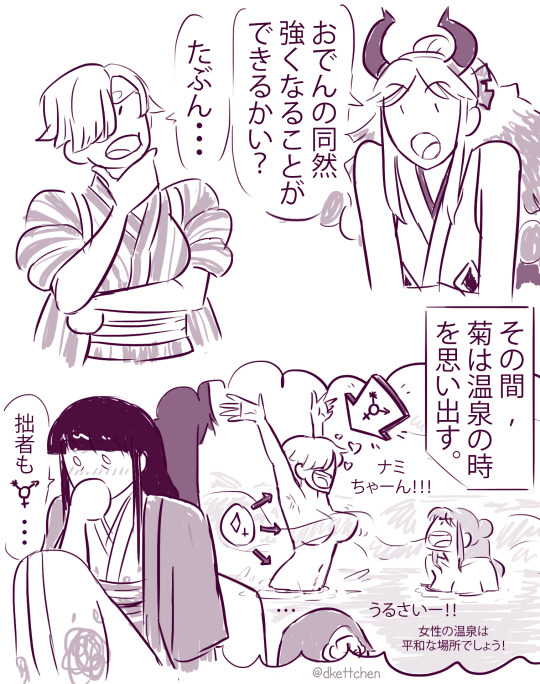
she would've told them unlike her canon! version who decided not to be an ally smh
#one piece#trans!sanji#sanji#kiku#yamato#ワンピース#I'm practicing my japanese shhhhhh#(日本語のペラペラ人:俺は文法とか書く方とか間違ったら教えてください😅ありがとうございます)#translation:#Yamato: I'll be able to get as strong as Oden?#Sanji: Probably... 🤔#[meanwhile Kiku is remembering the time in the hot spring]#(Sanji: Nami-chan!!!)#(Nami: Shut up!! The women's bath is supposed to be a peaceful place!)#Kiku: I am also ⚧️ ... o.o#(y'all english speakers had me all to yourselves for a decade it's about time I start to also sometimes make stuff in my next language lol#notably for media *from* that language#same as it made sense to make fan content in english for [american superhero franchise we don't talk abt anymore] back in the day#(happy seasonal reminder that Ren Is Not A Native English Speaker and This Is My 5th Language hi 😅))#while looking up reference for this I learnt that the straps to tie back the kimono sleeves are called tasuki#also I decided yamato get big muscles cause he got them kaido genes in im (I also gave him his dad's young-man-facial hair)#the more I do transition projections for one piece characters while tryna adhere to the style the more I learn that sometimes stylisation#uses bones less as literal determinants for where things go and just kinda exaggerates shapes based on vibes alone instead#meaning trans characters' bones wouldn't literally stay looking the same in that stylisation in the way they do irl#they'd get exaggerated differently based on what the surrounding stuff is doing#I still think oda's transition demonstration when we first met iva was unreasonable even with that in mind tho
2K notes
·
View notes
Text
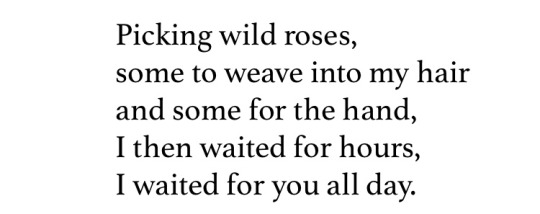
Yosano Akiko, tr. by Sam Hamill & Keiko Matsui Gibson, from River of Stars: Selected Poems of Yosano Akiko
[Text ID: “Picking wild roses, / some to weave into my hair / and some for the hand, / I then waited for hours, / I waited for you all day.”]
#yosano akiko#flowers#love#longing#excerpts#writings#literature#poetry#fragments#selections#words#quotes#poetry collection#typography#poetry in translation#japanese literature#japanese poetry
3K notes
·
View notes
Text

We hope you are staying cool during this hot summer. The sunlight is so strong that it could turn you into a dried fish, but the young people of this region seem to be used to it.
Don't forget to take precautions against the heat and enjoy the summer!
#splatoon 3#splatoonusna#nintendo#nintendo switch#the official na post was...very sad translation wise so i just altered the japanese text a bit since it's a lot cuter
738 notes
·
View notes
Text




Mana, the absolutely iconic Nico fan, (check here and here for the lore) met him again in Singapore!!!
#mana <3#Singapore grand prix 2024#im sure the Japanese is sweeter than the translation#nico rosberg#she's so real she's loved him since he was in Williams
878 notes
·
View notes
Text

late night/midday texting
#beware guguru translate japanese#rough translation is#oi#come home#or else i crush her head#yuta okkotsu#toge inumaki#inuokko#i suppose? implied at least#jjk#jujutsu kaisen#art#fanart#maki zenin#nobara kugisaki
646 notes
·
View notes
Note
I was reading - or rather watching - the book dedicated to Daydream Hour released this year, and I came across some pages dedicated to the various characters who give each other Christmas presents. I found it very funny from what little I understood with Google Lens, and was wondering if there was an unofficial English translation. Thanks in advance if you can find it. P.S Pages from 130 to 135 in case you don't understand which ones I mean.
Oh boy, I do have a translation but I think this version is so confusing, it's from when it was in ryoko kui's blog i think
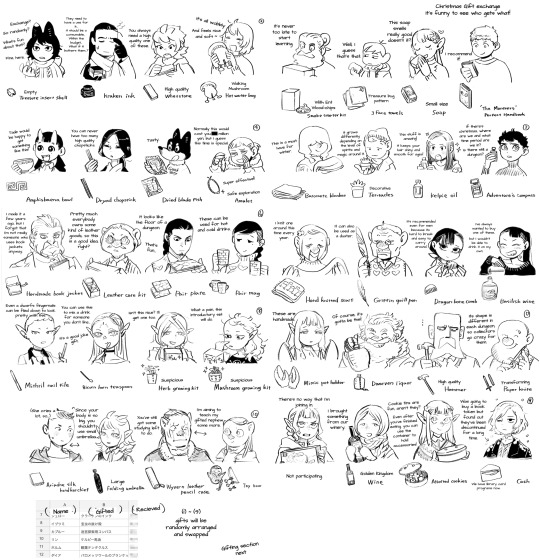
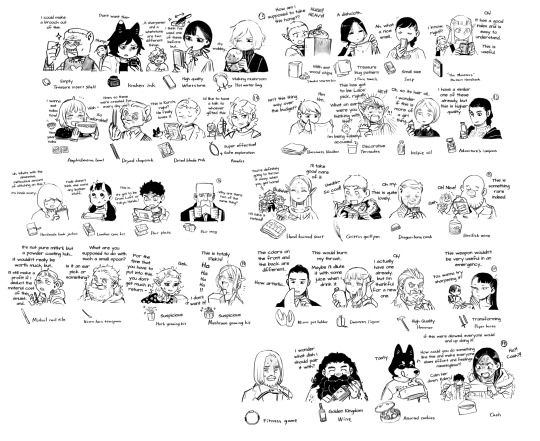
Too much information for me LOL
Here's the untranslated daydream hour version
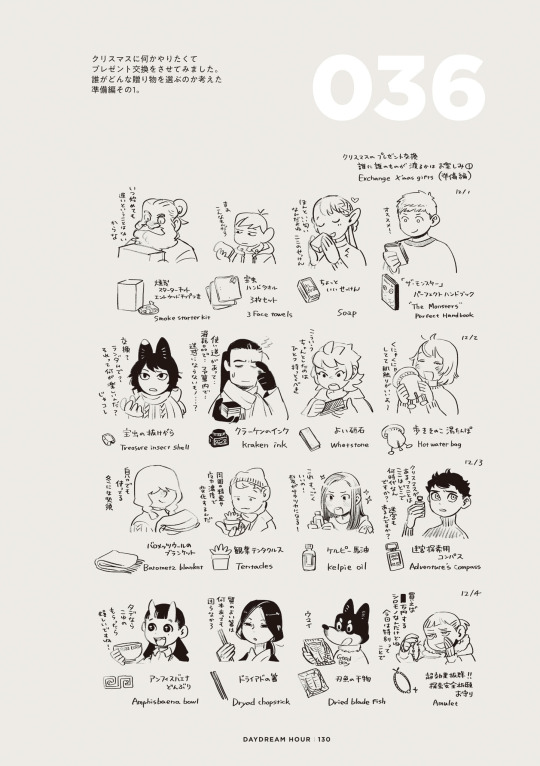
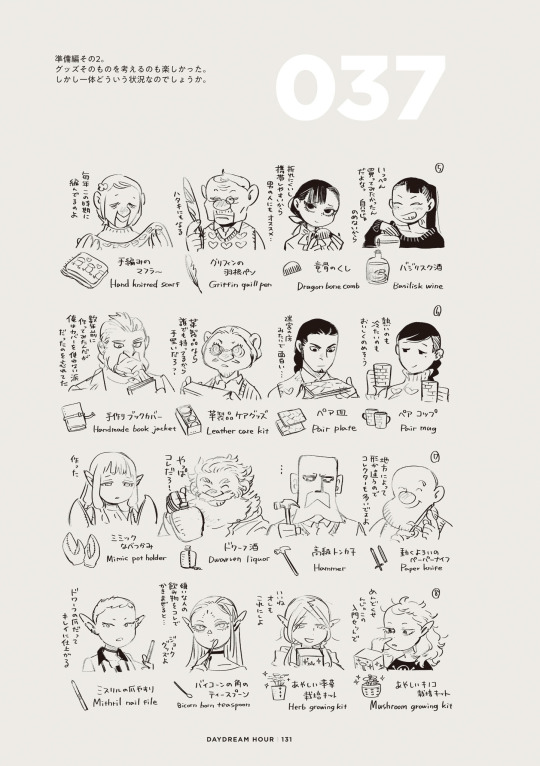
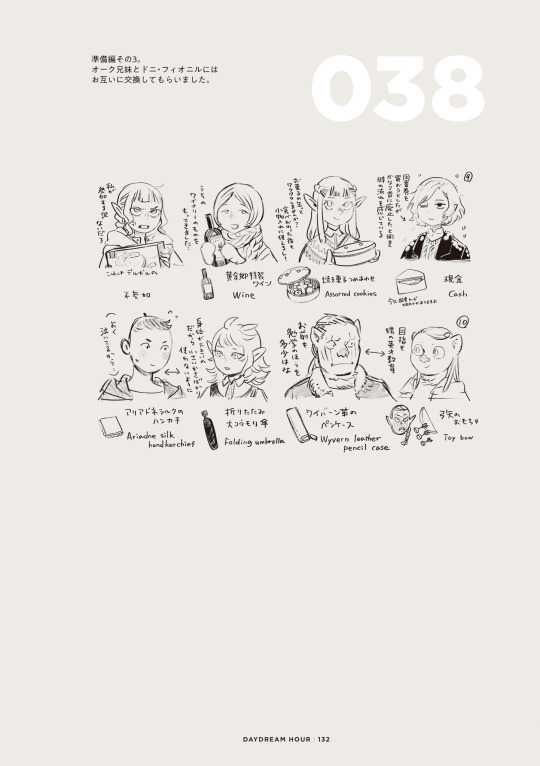
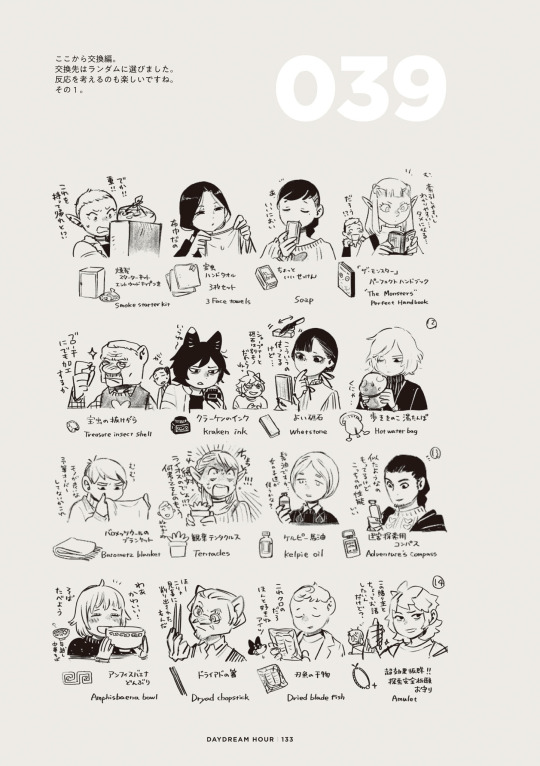
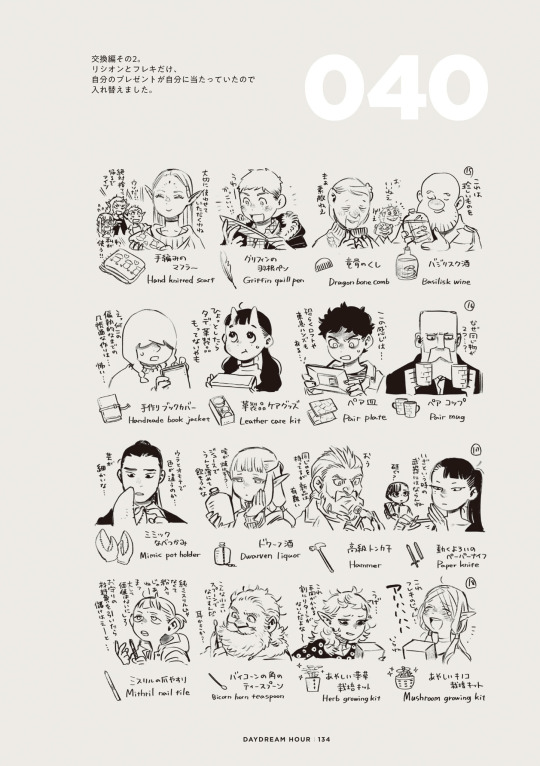
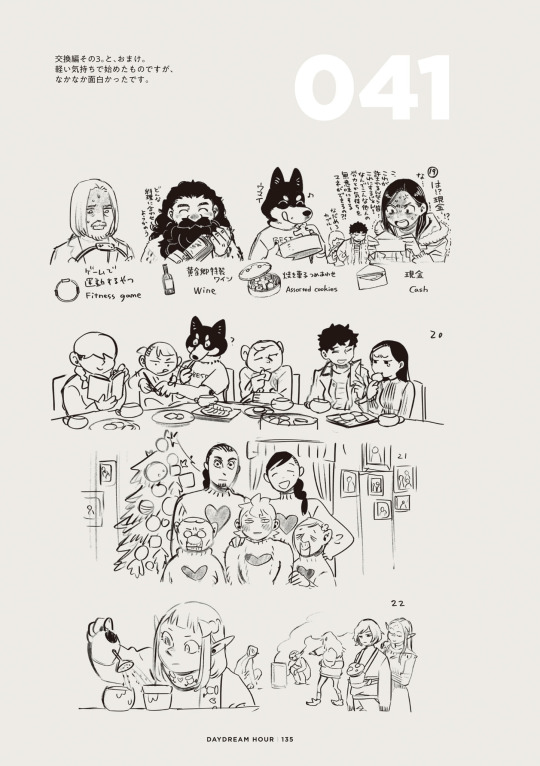
Yes that's where the Floke family christmas pic comes from.
#ask#daydream hour#translation#gift exchange#modern clothing#I thought about putting the other translation on the daydream hour version#but I'd feel weird just copying a translation without being able to double check myself.#And I can barely translate typed japanese with google's help#hand written is my worst enemy
2K notes
·
View notes
Text



haruki murakami (pinball 1973)
#parallels#art parallels#quotes#literature#translated literature#japanese literature#haruki murakami#my photography#art#museums#hermitage
3K notes
·
View notes
Text
When you find out that in season 2 during the Hidden Inventory Arc Gojo legit put sash on Nanami that read "Today's Main Character" because it was his birthday.


I'm legit crying because Gojo would totally do that 😭
#jujutsu kaisen#jujutsu sorcerer#jujutsu kaisen hidden inventory#nanami kento#kento nanami#gojo satoru#satoru gojo#today's main character#japanese translation
518 notes
·
View notes